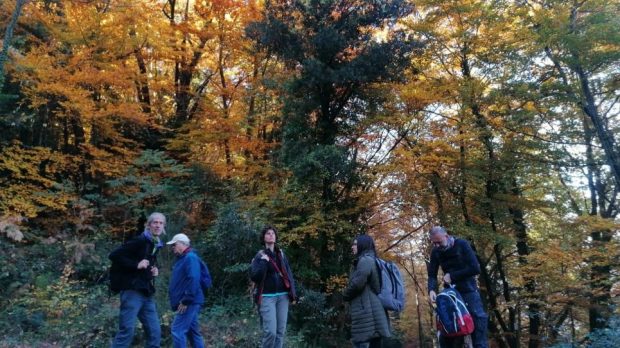CT BETA participates in the development of sustainable tourism packages
This collaboration has been carried out for three years in the framework of DestiMED PLUS, a European project funded by the Interreg MED program

The BETA Technological Center of the UVic-UCC and the Department of Climate Action, Food and Rural Agenda have collaborated over the last three years in the deployment of pilot actions to promote sustainable tourism in the Garrotxa Volcanic Zone Natural Park, as well as to calculate its social and environmental impact.
This collaboration has been carried out for three years within the framework of DestiMED PLUS, an European project funded thanks to the European Interreg MED program. This project has made it possible to invest nearly 3.6 million euros in the deployment of actions to promote sustainable tourism in protected areas in six Mediterranean countries.
The project has worked to create new resources to increase the capacity of local and regional agents in the Mediterranean Region to incorporate sustainable tourism and nature conservation into their agendas. The DestiMED PLUS project has sought to accompany these stakeholders in the definition and implementation of cross-cutting measures for the integration of tourism and conservation policies in protected areas, through the creation of tourism packages developed on the basis of a collaborative approach.
In this sense, following the guidelines set by the project and those already established in the Natural Park since 2001 with the accreditation of the European Charter for Sustainable Tourism, we have worked on the creation of tourist packages that are more respectful of the environment in agreement with the public and private tourism sector. This is the case of the ecotourism package called “Walking among landscapes”, which consists of 7 days and 6 nights, in which the visitor can walk and discover different places of the Park and enjoy the gastronomy of the region accompanied by a local guide. The proposal has been designed taking into account criteria of collaboration with the natural space and of deseasonalization, decentralization, diversification and reduction of the ecological footprint.
New methodologies for calculating social sustainability
The BETA Technology Center of the UVic-UCC has been applying the experience of its Accounting and Sustainability Optimization Area in the DestiMED PLUS project. Specifically, it has focused its efforts on updating quality and sustainability standards applicable to tourism packages. These standards address all aspects necessary to establish sustainable tourism offers in protected areas. This ranges from tourism governance and conservation actions, product quality and the calculation of its ecological footprint to the analysis of the socioeconomic and social impacts of the suppliers involved.
The part that has been most worked on by CT BETA is related to the analysis of social sustainability, and has been done based on the adaptation of Social Life Cycle Analysis (SLA) methodologies. These methodologies are used to quantify the positive and negative social impacts of products and services.
The methodology proposed from the BETA TC allows measuring the social impacts that the suppliers of accommodation, food, activities and transportation of tourism packages impose on different relevant social groups, such as workers, the local community, the value chain and tourists in a systematic way, while promoting the continuous improvement of the social behavior of the suppliers of ecotourism packages.
The DestiMED PLUS project
The DestiMED PLUS project is coordinated by the Lazio Region (Italy). Apart from the Department of Climate Action, Food and Rural Agenda and the BETA TC of the UVic-UCC, also the International Union for Conservation of Nature (IUCN) – MED (Andalusia), the Conselleria de Medio Ambiente y Ordenación del Territorio of Andalusia, the region of Crete (Greece), the Agency for the Development of the Region of Crete (Greece), the Agency for the Development of the South Aegean Region (Greece), the National Agency for Protected Areas of Albania, the Conference of Peripheral Maritime Regions (Brittany), the Department of Environment, Nature Conservation and Forestry Policy of Sardinia (Italy), the Corsica Tourism Agency (France), and the Croatian Tourism Institute.
